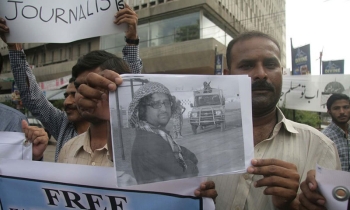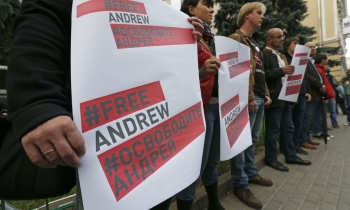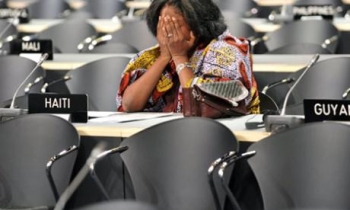Press freedom groups have condemned the government’s closure of the Kuwait City bureau of the Doha-based satellite TV station Al-Jazeera for covering police use of force to disperse an unauthorised demonstration at Soulaibikhat, 10 km from the city centre, on December 8.
“This closure violates the legal procedures and regulations in force in Kuwait,” Paris-based press Reporters sans Frontières (RSF) said. “We urge the authorities to reissue Al Jazeera’s journalists with accreditation so that they can go back to work. Freedom of expression is guaranteed by Kuwait’s constitution.”
Opposition members organised the demonstration to protest against a proposal to amend the 1962 constitution. The government warned them in advance that it would not be authorized and told them to hold it indoors. When the demonstrators, who included around ten parliamentarians, went ahead with the protest in the street, anti-riot police attacked them, hitting them with batons. Several of the protesters had to be hospitalized with fractures and other injuries.
Hassan Saeed Elmogummer Taha, a news producer with Al-Jazeera, told New York-based Committee to Protect Journalists (CPJ) that the Ministry of Information called the station's office in Kuwait on Friday and warned that the ministry would close the office if Al-Jazeera interviewed opposition MP Musallam al-Barrak. "We informed the ministry that we don't take editorial guidelines from governments," Taha told CPJ. The interview with al-Barrak aired on Sunday.
Faysal al-Mutlaqim, the director of the department of audiovisual media at the Ministry of Information, said that "the withdrawal of the station's license and the closure of its office was a ministerial decision following the station's broadcast of recent events in Kuwait, and the meddling in internal affairs, despite warnings previously sent by the ministry to all media not to publish or broadcast any news about recent events and not to raise the issue," official Kuwait News Agency (KUNA) reported.
“This was an outrage unprecedented in Kuwait’s political history,” opposition parliamentarian Jaman Al Herbish told Reuters. “There was a deliberate intention to physically assault the opposition.”
"We call on Kuwaiti authorities to allow Al-Jazeera to immediately resume its operations and to reinstate all staff accreditations," said Mohamed Abdel Dayem, CPJ's Middle East and North Africa programme coordinator. "It is deeply ironic that the government should acknowledge publicly and without any apparent embarrassment that it is closing the Al-Jazeera bureau because the journalists there did their jobs. Publishing news about 'recent events' is pretty much a good description of what journalists do every day."
“The authorities must face up to their responsibilities,” RSF said. “A TV station should not be made to pay because of violent behaviour by the police, especially when many websites covered the event, resulting in fierce criticism. We urge the government to carrying out an independent and transparent investigation into this use of violence by the police.”
Writer and lawyer Mohamed Abdel Qader Al-Jassem, the author of many articles critical of the prime minister, has meanwhile been the victim of judicial harassment since August 2009. According to his lawyer, he was acquitted nine times before being sentenced to a year in prison with forced labour on November 22. His case has been transferred to a special court and he is facing the possibility of an additional one-year sentence when he is tried again tomorrow. In the meantime, he underwent triple bypass surgery on December 8.
RSF reiterated its call for Al-Jassem’s release and a halt to all the prosecutions being brought against him. The politicization of the judicial apparatus poses a serious threat to the future of democracy in Kuwait.










